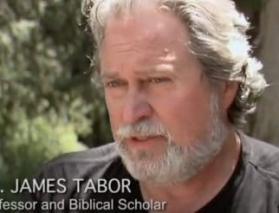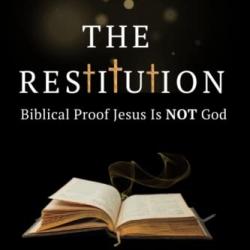Nearly all Christians have believed Jesus is God. Scholars call them “traditionalists.” And most scholars claim that the foremost New Testament (NT) book that identifies Jesus as God is the Gospel of John. It contains the two most formidable NT texts that have been interpreted as declaring that Jesus is God. They are John 1.1 and 20.28.
Even liberal and historical-critical NT scholars, such as those of the Jesus Seminar, assert that the Gospel of John presents Jesus as God. Since the synoptic gospels do not, most of these scholars deem this gospel a fictional creation of the church and thus historically inaccurate. Ernst Kasemann called it “naïve docetism.” He said sarcastically, “John changes the Galilean teacher into the God who goes about on the earth.”
Albert Schweitzer acknowledged that the first scholars to allege a disparity between the Synoptic Jesus and the Johannine Jesus were skeptic D.F. Strauss and F.C. Bauer. Later, Rudolf Bultmann followed Wilhelm Bousset in proposing the Gnostic Redeemer myth as the primary basis of Johannine Christology. It is about a heavenly being sent to earth to become man, redeem humans by enlightenment, and return to heaven. But it was later discovered that this myth originated in Persia (Iran) in the second century.
The Gospel of John has been very misunderstood. It is mostly because it is “the spiritual gospel,” as church father Clement of Alexandria rightly described it, and scholars ever since have endorsed this designation. It is because the Johannine Jesus used so much figurative language (John 10.1-6; 16.25-30). Yet scholars often have not recognized this and treated some of Jesus’ words literally when he meant them metaphorically.
One of many examples is Jesus’ lengthiest sermon in the NT, in John 6, spoken to a “multitude.” Nearly all commentators have interpreted it as Jesus asserting preexistence. Here are some excerpts: “I am the bread of life. Your fathers ate the manna in the wilderness, and they died. This is the bread which comes down out of heaven, so that one may eat of it and not die….He who eats My flesh and drinks My blood has eternal life, and I will raise him up on the last day” (John 6.48-50, 54). It is inconsistent hermeneutics to interpret “bread” and “eats My flesh and drinks My blood” metaphorically yet not do so with “comes down from heaven.” Many of those “disciples” grumbled, saying, “This is a difficult statement; who can listen to it?” (v. 60). Jesus replied, “the words that I have spoken to you are spirit and are life” (v. 63). Jesus here explains that he was speaking figuratively of “the words.” So, he did not mean that he literally preexisted and came down from heaven to become a man.
It is an error to interpret that any of the Gospel of John declares that Jesus is God. Rather, this gospel presents Jesus’ humanity and his subordination to the one and only sovereign God more than the synoptics do. And it contains the foremost verse in the Bible which shows Jesus cannot be God. It is when Jesus himself prayed to the Father, saying, “This is eternal life, that they may know You, the only true God, and Jesus Christ whom You have sent” (John 17.3). So, Jesus here calls the Father “the only true God,” thus distinguishing himself from God. Earlier, and similarly, Jesus called the Father “the one and only God” (5.44). In each case, Jesus affirms the Jews’ Shema that God is numerically “one” (Deuteronomy 6.4).
However, the standard text in John 1.18 contradicts this. It states, “No man has seen God at any time; the only begotten God, who is in the bosom of the Father, He has explained Him.” This is the only occurrence of “only begotten God” in the Bible. Some Greek manuscripts have huios (Son) here, thus translated “only begotten Son.” That is quite Johannine (3.16, 18; 1 John 4.9). But the earliest manuscripts of 1.18, and thus supposedly the best, have theos (God). Unbiased folks would think this rendering says there are two Gods. Some scholars think this theos is a spurious substitution for huios by a later scribe who believed Jesus was God.
Over half of the NT texts which traditionalists cite to support that Jesus is God have grammatical problems. The main one is John 1.1c. It usually is translated, “and the Word was God.” But “God” (theos) is anarthrous (without the article). This somewhat unusual grammatical construction is problematic. That’s why Jehovah’s Witnesses wrongly translate it, “the Word was a god,” and some scholars render it “divine.” William Barclay was right in saying the New English Bible has the perfect translation of it—“what God was, the Word was.” This says the Word was exactly like God, not the Word was God.
That is what the Johannine Jesus meant when he later said to Thomas and Philip, “He who has seen Me has seen the Father” (John seen the Father” (John 14.9). Many Christians have misunderstood this saying, thinking Jesus identified himself as the Father. That is even anti-Trinitarian. Rather, Jesus next explained what he meant, that “the Father is in Me” (v. 10, cf. v. 11).
In the Gospel of John, it is thought that John the Baptist and Jesus say Jesus preexisted. Many traditionalists have insisted this indicates he is God. But some of these texts merely signify rank (John 1.15, 30; 8.58). And in Jesus’ discourse on his being the bread of life come down from heaven, he meant it spiritually, not literally (6.32-58, 63; cf. 8.23). Plus, mention of his glory in John 17.5, it’s likely the Shekinah, not himself, which preexisted.
Ask traditionalists who know their Bible, “Where in the Bible does Jesus say he is God?” They’ll likely answer, “in John 10.30 he said, ‘I and the Father are one.’” But its previous context reveals that Jesus meant only that they were unified in purpose. Plus, he explained “one” by saying, “the Father is in Me, and I in the Father” (v. 38; cf. 17.11).
Most scholars claim that the foremost biblical text which declares unequivocally that Jesus is God is doubting Thomas’ confession to the risen Jesus, “My Lord and my God!” (John 20.28). On the contrary, Thomas meant what Jesus taught him and Philip ten days earlier, about seeing the Father in him (John 14.9-11). That is, Thomas now understood that the Father indwells Jesus, which is not the same thing as Jesus being God.
Also, John records only a few verses earlier that the risen Jesus commanded Mary Magdalene, “go to My brethren, and say to them, ‘I ascend to My Father and your Father, and My God and your God’” (v. 17). She did and exclaimed to them, “I have seen the Lord” (v. 18). This context suggests that the author understood Thomas to mean that Jesus is Lord and the Father in him is God. And it is very unlikely that the author would present Jesus calling the Father “My God” and Thomas calling Jesus “my God.”
Two verses later John ends his gospel by saying, “Many other signs therefore Jesus also performed in the presence of the disciples, which are not written in this book; but these have been written that you may believe that Jesus is the Christ, the Son of God, and that believing you may have life in His name” (John 20.30-31). Saying Jesus is the Son of God is anti-climatic if only two verses prior it was said that he is God.
In sum, the Gospel of John is very historically reliable. It has been misinterpreted to say Jesus is God partly due to failure to recognize it as the spiritual gospel. Instead, it parallels the synoptic gospels by declaring Jesus is the Christ, the Son of God, not that he is God.
(Scripture quotations are from the New American Standard Bible. This post represents a summary of some of my 600-page book, The Restitution of Jesus Christ. The book has 100 pages devoted to interpreting critical texts in the Gospel of John as to whether or not Jesus is God.)
…………….
To see a list of titles of 130+ posts (2-3 pages) that are about Jesus not being God in the Bible, with a few about God not being a Trinity, at Kermit Zarley Blog click “Chistology” in the header bar. Most are condensations of my book, The Restitution of Jesus Christ. See my website servetustheevangelical.com, which is all about this book, with reviews, etc. Learn about my books and purchase them at kermitzarley.com. I was a Trinitarian for 22 years before reading myself out of it in the Bible.















